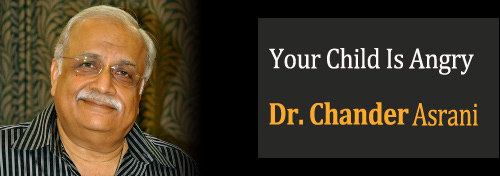Your Child Is Angry
“Doc, she has started stammering again!” Parents of a 5 yr. old, H, presented with the girl; a cute, chubby baby, very fair with blonde hair – almost like a westerner! The girl had normal milestones; had started talking at one and half and by three had a clear diction and was talking without any stammer and a sufficiently large vocabulary.
“Last few months, she started stammering; we initially thought she is teasing us but it is getting worse daily.” Such instances are not uncommon. Children, after having achieved a milestone, regress and start behaving like a younger child once again. Examples: A child who is talking normally, starts stammering again OR A child who has gained control of passing stools, loses control again (known as encopresis) OR a child who has gained control of passing urine, starts bedwetting again OR an otherwise quiet child who suddenly becomes aggressive; starts biting; starts hitting etc etc.
Any or all of the above points towards some form of stress or insecurity in the child. Stammering in H was attributed to stress of beginning primary school after pre-school. I spoke to the child; ensured that she has no fears of the school/ teachers/ other students. Gradually H stopped stammering and all was forgotten till 4 years later!
H’s parents came one day, worried, and said “doctor for last 2 months different keys of the house were getting lost/ misplaced; we had to make duplicate keys of almost all the locks; then mysteriously they would appear lying somewhere. Yesterday a lady from the opposite building saw H throwing the car keys on the window parapet. Now she has confessed of having hidden all the keys and after we had gone to the trouble of making duplicate one, she would put it back in a place where they could be found.
I made them consult a child psychologist, who immediately said, “Your child is angry about something and this behaviour indicates she has told you all about it but no one has taken cognizance of her complaint”
“But, doctor, she is the most loved one of our three daughters. What can be she be angry about? And anger in a 9 year old child? She never told us she is angry; she is so well behaved.” Parents wouldn’t believe that H has done all this, knowingly, in anger! Reason of anger – they couldn’t fathom.
After 3-4 sessions with the psychologist, H revealed that she hated being dressed like a boy (because of her looks, her parents used to get boys’ dresses for her – which would suit her so much so that all onlookers commented how nice she looked). She had always objected to such dresses and wanted to wear frocks like her other two sisters; she had told her mom time and again about it but no one took it seriously.
How can anger make a child do such a thing!
Anger is like steam in a pressure cooker. If left unchecked the pressure of negative emotion increases from frustration to anger; it may either go on to become rage and child/adult may hit out. In some soft people it may become bitterness. H was bitter and was, in her own way, giving it back to her family members. She had kind off shut herself off from others.
And suppose H’s family had realized that H is angry; what they may have done? Nothing, I feel. Most family members do not take anger of another family member seriously. And anger of a 9 yr old! They somehow just go on, hoping things will smoothen out on their own. They don’t resolve the anger or the issues involved without realizing if one tends to ignore the problem it can boomerang.
Children don’t recognize their anger. H did not know she is doing it in anger; many a times they act out before they realize what exactly has happened. If parents identify the cues that their child is beginning to get frustrated they may be able to modify their responses and prevent that frustration from turning into anger.
I have given some pointers towards child being in stress; here are some more cues that will help parents identify stress/ frustration/ anger in a child: tendency to pout, strange facial expression, clenching of teeth, aggressive speech or behaviour, restlessness, not responding, withdrawn or easily provoked.
Parents have to understand themselves and help children understand the fact that if you are angry at something – you have identified the problem; Anger is good only for identifying problems but it cannot solve that problem.
Dr Chander Asrani, father to three daughters and grand father to one, is a post-graduate in Family Medicine. He has over 35 years in clinical practice, launched www.growingwell.com in 2000 and since then has been writing on various subjects. Know more about him at about.me/drasrani.

